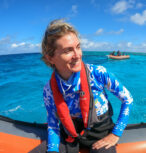DNA reveals the past and future of coral reefs
New DNA techniques are being used to understand how coral reacted to the end of the last ice age in order to better predict how they will cope with current changes to the climate. James Cook Univer

From 2005 to 2022, the main node of the ARC Centre of Excellence for Coral Reef Studies was headquartered at James Cook University in Townsville, Queensland (Australia)








Abstract:
The past few years have seen unprecedented coral bleaching and mortality on the Great Barrier Reef (GBR) but the consequences of this on biodiversity are not yet known. This talk will explore if mass bleaching has resulted in a loss of symbiont diversity across three key coral species along the GBR and examine if surviving coral populations contain a higher prevalence of heat tolerant algal symbionts – depending on their availability in the environmental pool. Results have implications for developing a spatially explicit understanding of symbiosis after bleaching to identify key coral populations for protection, key reefs for resilience management, and potential breeding stock for use in reef restoration activities.
Bio:
Kate is a Senior Research Scientist at Minderoo Foundation and Research Director of the Minderoo Exmouth Research Laboratory and holds adjunct research positions at the University of Western Australia, the Australian Institute of Marine Science, and James Cook University. As a molecular ecologist, her current research focusses on understanding adaptation and the genomic basis of stress tolerance and resilience of coral reef organisms across the Indo-Pacific and Indian Oceans. She uses ‘omics tools (population genomic, transcriptomic, metagenomic) and coral reproductive biology with field, experimental, and modelling methods to understand what makes some species resistant to stress while others are more vulnerable.
New DNA techniques are being used to understand how coral reacted to the end of the last ice age in order to better predict how they will cope with current changes to the climate. James Cook Univer
A new study on the effects of climate change in five tropical countries has found fisheries are in more trouble than agriculture, and poor people are in the most danger. Distinguished Profess
James Cook University researchers have found brightly coloured fish are becoming increasingly rare as coral declines, with the phenomenon likely to get worse in the future. Christopher Hemingson, a
Researchers working with stakeholders in the Great Barrier Reef region have come up with ideas on how groups responsible for looking after the reef can operate more effectively when the next bleaching
Abstract: As marine species adapt to climate change, their heat tolerance will likely be under strong selection. Individual variation in heat tolerance and its heritability underpin the potential fo
Abstract: The Reef Ecology Lab in KAUST’s Red Sea Research Center explores many aspects of movement ecology of marine organisms, ranging from adult migrations to intergenerational larval dispersal
Abstract: Macroalgal meadows are a prominent, yet often maligned component of the tropical seascape. Our work at Ningaloo reef in WA demonstrate that canopy forming macroalgae provide habitat for ad
Abstract: Sharks are generally perceived as strong and fearsome animals. With fossils dating back at least 420 million years, sharks are not only majestic top predators but they also outlived dinosa
Abstract: Connectivity plays a vital role in many ecosystems through its effects on fundamental ecological and evolutionary processes. Its consequences for populations and metapopulations have been
Abstract: Evolution of many eukaryotic organisms is affected by interactions with microbes. Microbial symbioses can ultimately reflect host’s diet, habitat range, and even body shape. However, how
Abstract: The past few years have seen unprecedented coral bleaching and mortality on the Great Barrier Reef (GBR) but the consequences of this on biodiversity are not yet known. This talk will expl